Trump trials: Why former president faces ‘extraordinary’ challenges
- Oops!Something went wrong.Please try again later.
WASHINGTON — The traffic jam of four criminal trials pending against Donald Trump has left prosecutors and judges struggling to get any of them moving while avoiding collisions.
The result leaves open the question of which – if any – will begin before the November election. Prosecutors are eager to get verdicts before Election Day, but legal experts say the first trial might not start until summer, as issues are debated and appealed.
The first trial, on federal charges the former president tried to overturn the 2020 election, is tentatively scheduled for March 4 in Washington. But preparations are on hold while Trump argues that he is immune to the charges at the D.C. Circuit Court of Appeals − and potentially at the Supreme Court.
Another appeal before the Supreme Court – with potentially no answer for months – could upend two of the four charges against Trump, as well as those against hundreds of defendants in the Capitol attack on Jan. 6, 2021.
Next up is a trial set for May 20 on federal charges Trump retained national defense records after leaving the White House. But legal disputes about how to handle classified records in the case could postpone it.
If either case slips too far, Justice Department policy is to not try politically sensitive cases within months of an election. But state prosecutors in Georgia and New York don’t face that restriction.
Steering a wide berth around the federal cases, Fulton County District Attorney Fani Willis proposed to start her election racketeering trial against Trump and 14 co-defendants on Aug. 5, which could overlap with the election. Trump lawyer Steven Sadow called the schedule potentially the "most effective election interference in the history of the United States."
Idling in the wings, Manhattan District Attorney Alvin Bragg has also waited on the federal cases for his trial on charges that Trump falsified business records.
Trump has argued that each case represents Democratic political interference against his Republican campaign to return to the White House, so all should be postponed until after the election. If he wins, Sadow contends the Constitution would prevent any state or federal trial while Trump serves as president.
“The preference would be that he’s not on trial while he’s campaigning," Sadow told Fulton County Superior Judge Scott McAfee earlier this month. But McAfee has not yet set a date.
Here is what we know about the four trials and their potential delays:
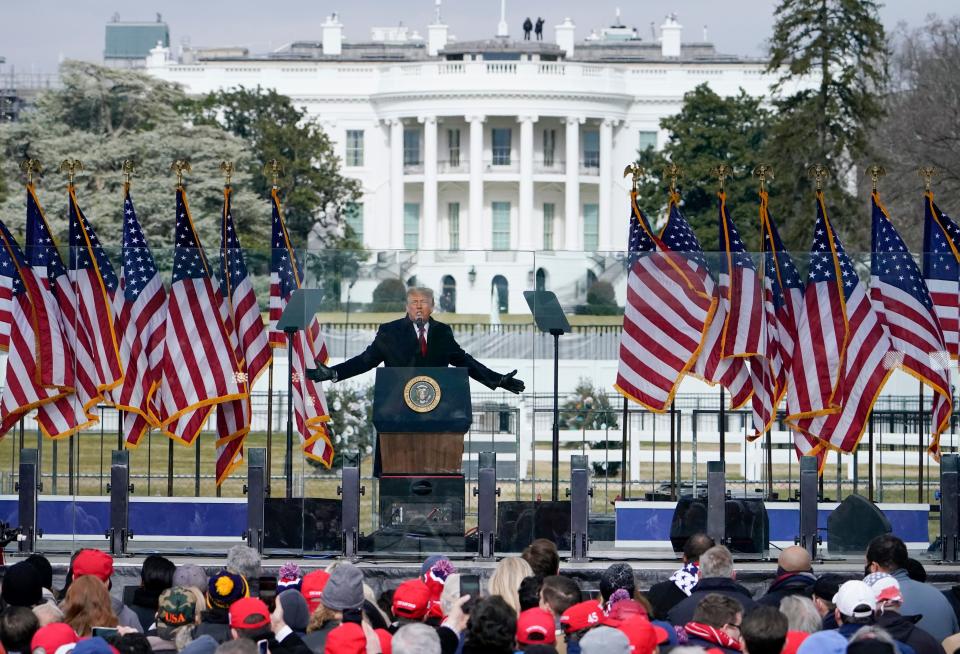
What could delay Trump's federal election interference case?
U.S. District Judge Tanya Chutkan rejected Trump’s request to dismiss the federal election interference case, when he argued he is immune to the charges for actions he took as president. But she put the case on hold while he appeals.
Rather than wait for the circuit court, Justice Department special counsel Jack Smith asked the Supreme Court to decide the case quickly. But the high court sent it to the circuit court, which could spend weeks or months weighing the case first at a three-judge panel and potentially before the full appeals court.
"The United States recognizes that this is an extraordinary request,” Smith wrote. “This is an extraordinary case."
Legal experts said the eventual Supreme Court decision could take time for such a historic decision.
“The fact that Jack Smith wants to go to trial by March 4, I don’t think they’re going to cause them to act precipitously,” Clark Cunningham, a law professor at Georgia State University, told USA TODAY. “Then they have to come up with a majority that’s going to be for the history books.”
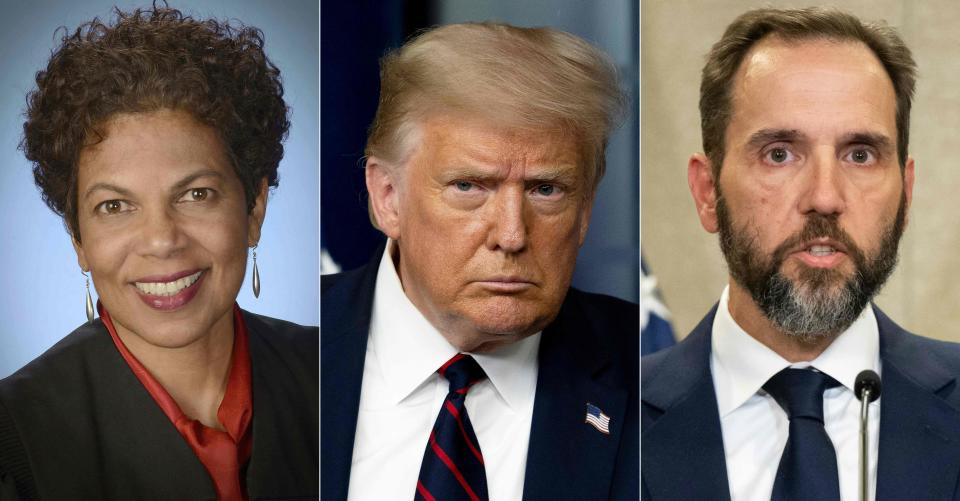
What other Supreme Court case could delay Trump's trial?
The Supreme Court could face another urgent case dealing with Trump over the holidays. The Colorado Supreme Court decided Tuesday to disqualify Trump from the state’s 2024 ballot for his role in the Jan. 6 insurrection, which his aides said they would quickly appeal.
Colorado’s secretary of state must certify the primary ballot by Jan. 5, which legal experts said might cause justices to cancel their holiday plans.
“This likely takes priority over Jack Smith’s request for quick SCOTUS review of immunity question,” Barb McQuade, a former U.S. attorney and now law professor at the University of Michigan, said on social media.
In another case the Supreme Court agreed to hear Dec. 13, the justices will decide whether to overturn two of the charges pending against Trump. The ruling might not come until the end of June.
The case was filed by Joseph Fischer, who was one of more than 200 people charged in the Jan. 6 riot with “corruptly” obstructing an official proceeding.
An 'anti-shredding' law for walking through the Capitol for a few minutes?
Fischer described the statute as an “anti-shredding” law that shouldn't apply to his walking through the Capitol for a few minutes. Congress approved the legislation in 2002 after Enron’s financial meltdown, and Fischer argued it was intended to punish people for tampering with evidence rather than participating in a riot.
But the Justice Department argued the official proceeding he obstructed was Jan. 6, when Congress was interrupted while counting Electoral College votes. The law could cover someone lying to a grand jury or “burning a building to conceal the bodies” of murder victims, prosecutors wrote.
Circuit courts have upheld the statute through several challenges, but the Supreme Court agreed to hear the case for potentially a different outcome. Two of Trump’s charges are based on the same statute.
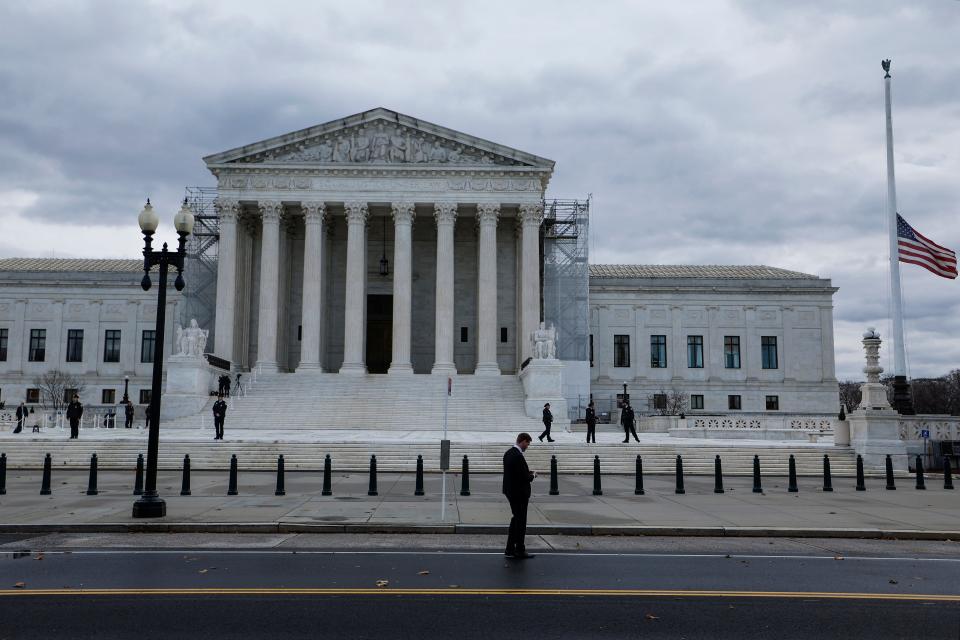
Classified documents case could be delayed: legal experts
Trump's Florida trial features 40 federal charges associated with storing hundreds of national defense records at his Mar-a-Lago club after leaving the White House in 2021. The challenges in the case include how to allow lawyers for Trump and his two co-defendants to deal with classified documents to prepare their defenses.
At a November hearing, U.S. District Judge Aileen Cannon pushed back several deadlines in the case and stuck to her May 20 trial date. But she said she would reconsider the schedule at a March hearing about classified documents.
“I think the classified documents issues will in fact prove to be more difficult than the judge in Florida has anticipated, and it will in fact get pushed back,” Stephen Saltzburg, a law professor at George Washington University, told USA TODAY.
McQuade, the former U.S. attorney, agreed that dealing with disputes over the Classified Information Procedures Act in March could postpone the trial.
“That trial could get pushed until after the election interference case later in the summer,” she told USA TODAY.
Federal prosecutors expected to keep election interference case ahead of documents case
If both federal trials are delayed, legal experts expect prosecutors to aim for keeping the Jan. 6 trial first.
Legal experts say the documents case may be easier to prove than election interference because the documents shouldn’t have been outside a secure government facility and the FBI seized the documents at Mar-a-Lago. But former Vice President Mike Pence and President Joe Biden also mishandled classified documents and have not been charged.
“In any other environment, the classified documents would be a slam dunk for the prosecutors,” Saltzburg said. “As bad as what happened in Mar-a-Lago was, I don’t think the public will respond to that in the same way they are likely to respond to a conviction for trying to steal the presidency.”
If the election interference trial is delayed a few months, it could basically take the place of the documents trial and coincide with a Supreme Court decision in the Fischer case resolving which charges are valid against Trump.
“A June trial date seems about right,” McQuade said of the election interference case.
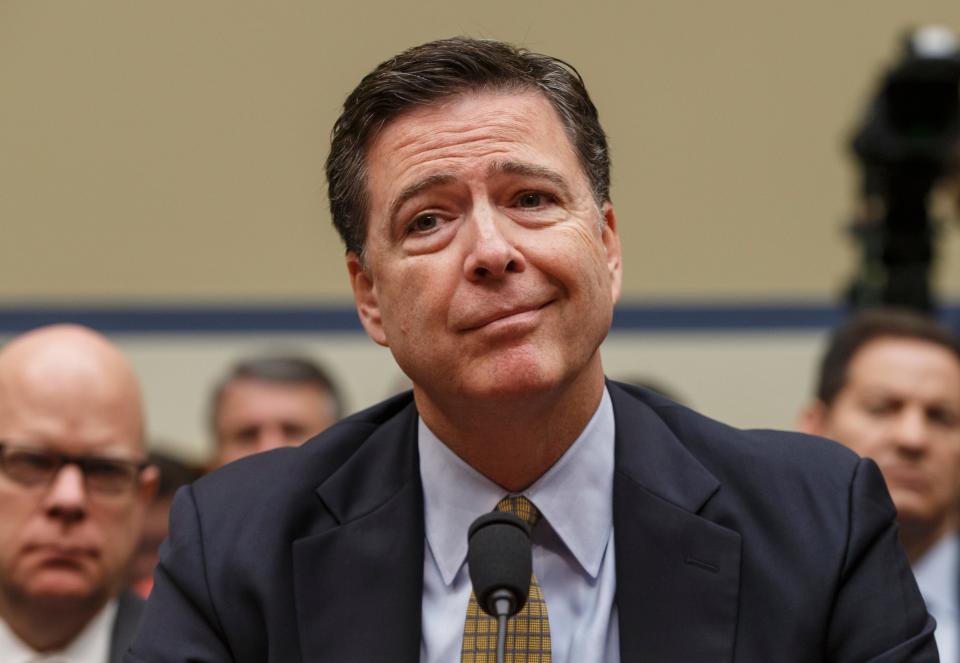
Justice Department policy discourages politically sensitive trials months before election
The challenge with federal cases slipping into August is that the Justice Department has an informal policy − not a formal regulation or law − against trying politically sensitive cases within two to three months of an election.
The risk that an investigation could influence an election was illustrated in 2016. Then-FBI Director James Comey announced days before the election that he was reopening an investigation into Democratic presidential nominee Hillary Clinton’s emails. She then lost to Trump.
Michael Horowitz, the Justice Department’s inspector general, reported on the tradition of an “unwritten 60-day rule” for delaying overt investigative steps close to an election. But he found the practice was "not written or described in any Department policy or regulation."
Former Attorney General Loretta Lynch told Horowitz’s team the general practice was not to take actions that might have an impact on an election, even if it wasn't an election case. Matt Axelrod, a former principal associate deputy attorney general, said there wasn’t a 60- or 90-day rule, but “the closer you get to the election, the more fraught it is.”
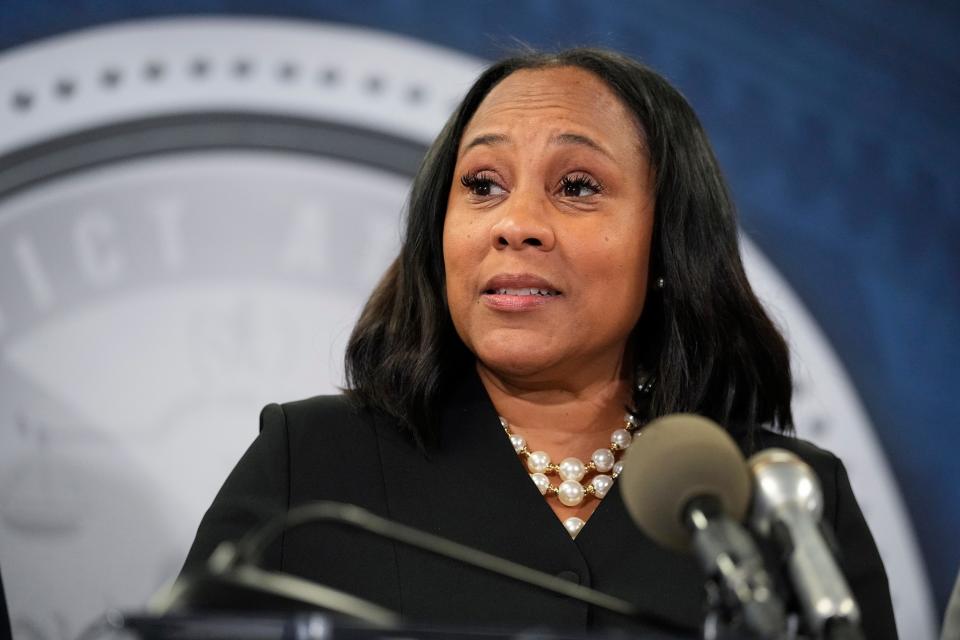
Could Georgia or New York prosecutors leapfrog the federal cases?
In contrast to the federal policy, state prosecutors face no similar restrictions on the timing of their trials. Trump faces 13 charges in Georgia alleging he conspired to overturn the 2020 election and 34 charges in New York alleging he falsified business records to pay hush money to women who claimed to have had sex with him.
So far, the local prosecutors have waited for federal prosecutors to try their cases. But legal experts speculated that Willis or Bragg could start their trials in February or March if the federal cases are postponed.
Neither prosecutor has actually proposed setting their case that early.
But Cunningham suggested Willis could hold a trial in February against Trump and a few co-defendants, such as campaign lawyers Rudy Giuliani and John Eastman, to resolve the case before the election. Giuliani spread baseless accusations of election fraud and Eastman developed a strategy for Republicans to field alternate presidential electors for Congress to count in states President Joe Biden won.
Buddy Parker, one of Eastman’s lawyers, asked to separate his case from others to avoid having it delayed into 2025.
“There are a number of defendants as noted who are not running for president of the United States,” Parker told McAfee during a Dec. 1 hearing. “We would like possibly to be earlier if we could be accommodated."
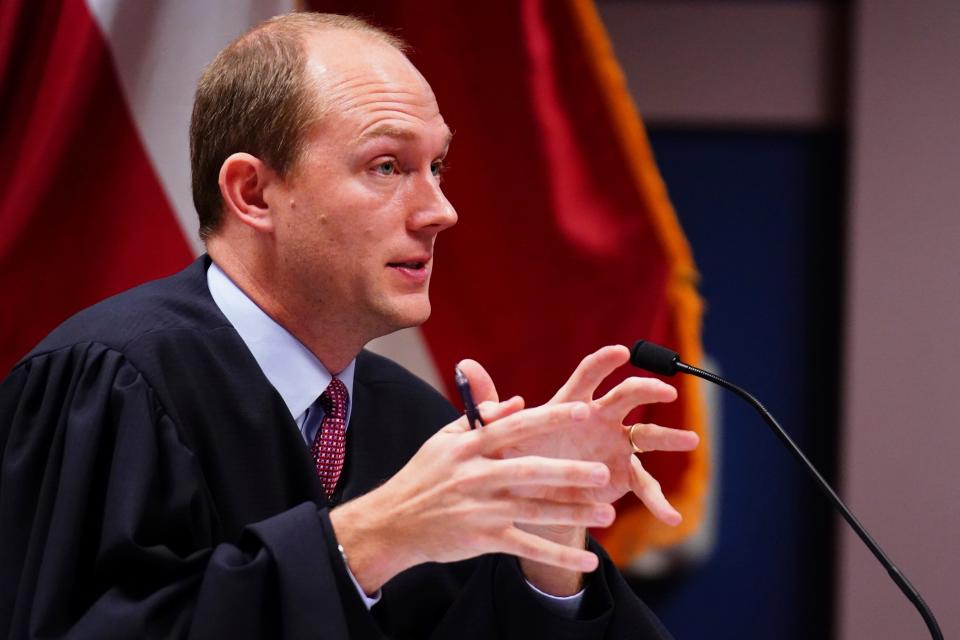
Willis has said she was prepared for trial in October, when co-defendants Sidney Powell and Kenneth Chesebro pleaded guilty before their scheduled trial.
McAfee said he was inclined to divide the 15 remaining defendants and hold at least two trials to avoid straining the judicial system. The prosecutors could choose the order, if that happens, he said.
“If you’re judge McAfee, certainly you would like for this trial to be over as early as possible in the election season,” Cunningham said.
New York, where Trump was first indicted, is another option. Bragg was initially given a trial date in March. His case has been on hold amid the legal jockeying, but would be another option for an early trial if the federal cases are postponed.
“That trial seems to be under the radar at the moment, but might be ready to go first,” McQuade said. “The Georgia case seems unlikely to start until fall, and then, the judge may find it too close to the election to begin.”
This article originally appeared on USA TODAY: Timeline for Trump's trials has become an ‘extraordinary’ juggling act

